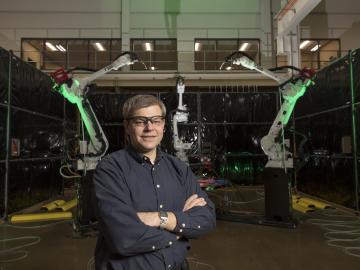
Filter News
Area of Research
- (-) Clean Energy (180)
- (-) Isotopes (26)
- (-) Nuclear Science and Technology (38)
- (-) Supercomputing (41)
- Advanced Manufacturing (22)
- Biology and Environment (38)
- Building Technologies (1)
- Computational Engineering (1)
- Computer Science (6)
- Electricity and Smart Grid (3)
- Fuel Cycle Science and Technology (1)
- Functional Materials for Energy (1)
- Fusion and Fission (30)
- Fusion Energy (10)
- Isotope Development and Production (1)
- Materials (66)
- Materials for Computing (11)
- National Security (29)
- Neutron Science (17)
- Nuclear Systems Modeling, Simulation and Validation (1)
- Quantum information Science (1)
- Sensors and Controls (2)
- Transportation Systems (2)
News Topics
- (-) 3-D Printing/Advanced Manufacturing (82)
- (-) Big Data (24)
- (-) Biotechnology (6)
- (-) Grid (42)
- (-) Isotopes (30)
- (-) Nuclear Energy (47)
- (-) Security (9)
- (-) Transportation (69)
- Advanced Reactors (16)
- Artificial Intelligence (41)
- Bioenergy (29)
- Biology (19)
- Biomedical (29)
- Buildings (37)
- Chemical Sciences (16)
- Clean Water (8)
- Climate Change (36)
- Composites (17)
- Computer Science (108)
- Coronavirus (25)
- Critical Materials (12)
- Cybersecurity (15)
- Decarbonization (35)
- Energy Storage (76)
- Environment (69)
- Exascale Computing (23)
- Fossil Energy (2)
- Frontier (28)
- Fusion (10)
- High-Performance Computing (39)
- Hydropower (2)
- Irradiation (1)
- Machine Learning (19)
- Materials (49)
- Materials Science (44)
- Mathematics (3)
- Mercury (3)
- Microelectronics (1)
- Microscopy (14)
- Molten Salt (5)
- Nanotechnology (15)
- National Security (12)
- Net Zero (4)
- Neutron Science (23)
- Partnerships (12)
- Physics (9)
- Polymers (13)
- Quantum Computing (19)
- Quantum Science (25)
- Renewable Energy (1)
- Simulation (16)
- Software (1)
- Space Exploration (13)
- Statistics (1)
- Summit (43)
- Sustainable Energy (71)
- Transformational Challenge Reactor (5)
Media Contacts

A residential and commercial tower under development in Brooklyn that is changing the New York City skyline has its roots in research at the Department of Energy’s Oak Ridge National Laboratory.
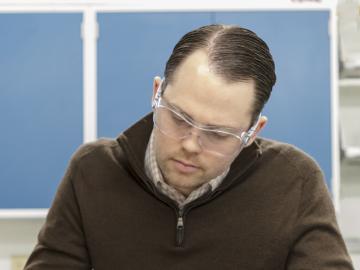
Oak Ridge National Laboratory is using ultrasonic additive manufacturing to embed highly accurate fiber optic sensors in heat- and radiation-resistant materials, allowing for real-time monitoring that could lead to greater insights and safer reactors.

Oak Ridge National Laboratory’s latest Transportation Energy Data Book: Edition 37 reports that the number of vehicles nationwide is growing faster than the population, with sales more than 17 million since 2015, and the average household vehicle travels more than 11,000 miles per year.
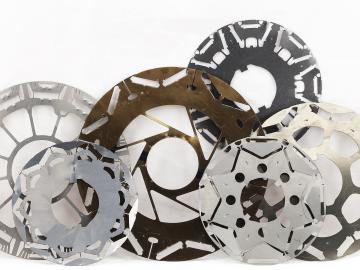
Oak Ridge National Laboratory scientists have created open source software that scales up analysis of motor designs to run on the fastest computers available, including those accessible to outside users at the Oak Ridge Leadership Computing Facility.
OAK RIDGE, Tenn., Feb. 12, 2019—A team of researchers from the Department of Energy’s Oak Ridge and Los Alamos National Laboratories has partnered with EPB, a Chattanooga utility and telecommunications company, to demonstrate the effectiveness of metro-scale quantum key distribution (QKD).
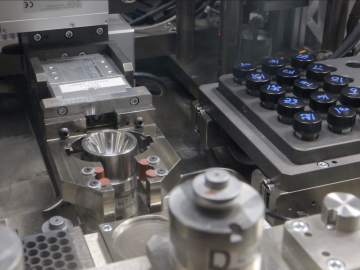
By automating the production of neptunium oxide-aluminum pellets, Oak Ridge National Laboratory scientists have eliminated a key bottleneck when producing plutonium-238 used by NASA to fuel deep space exploration.
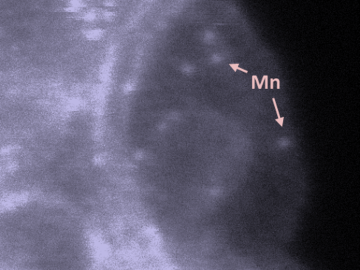
Oak Ridge National Laboratory scientists studying fuel cells as a potential alternative to internal combustion engines used sophisticated electron microscopy to investigate the benefits of replacing high-cost platinum with a lower cost, carbon-nitrogen-manganese-based catalyst.
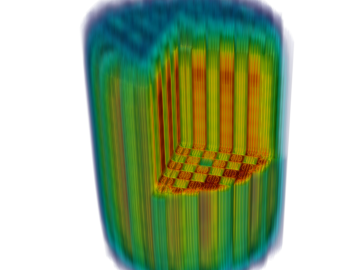
The Department of Energy’s Oak Ridge National Laboratory is collaborating with industry on six new projects focused on advancing commercial nuclear energy technologies that offer potential improvements to current nuclear reactors and move new reactor designs closer to deployment.
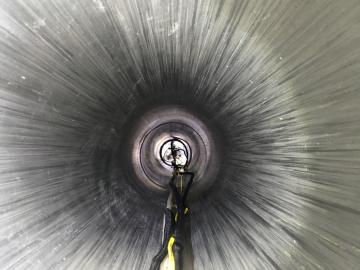
Scientists from Oak Ridge National Laboratory performed a corrosion test in a neutron radiation field to support the continued development of molten salt reactors.



